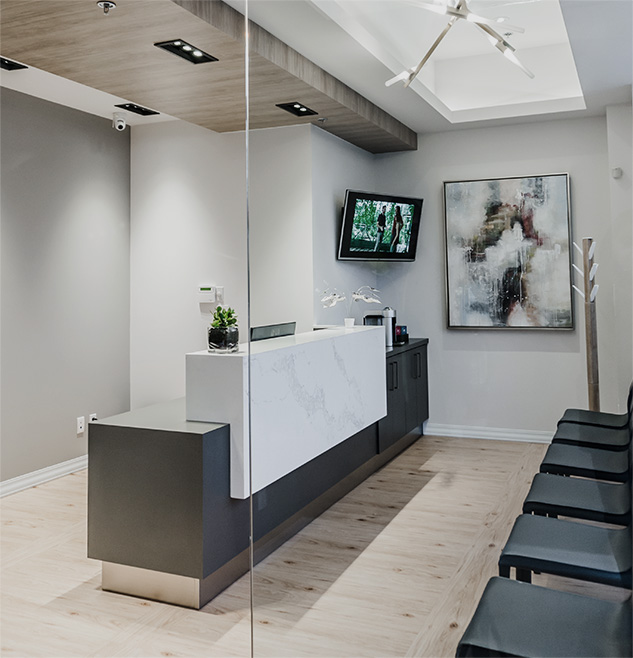Orthodontics for Jaw Health
Daily brushing and flossing are crucial for taking care of your dental health, but there’s more than your teeth and gums to consider. Dentists are trained to look at the bigger oral picture, such as bone and surrounding tissue—including your jaw and joints.
While many patients consider orthodontics for straighter teeth, orthodontics can fix multiple oral issues. For example, braces are often recommended if you have bite alignment or tooth orientation issues affecting your eating, speaking, and breathing ability.
One oral health problem that patients may overlook as a dental issue is TMJ disorders.
What Is TMJ?
TMJ (temporomandibular joint) disorders involve the joint between your jaw and skull. To understand how TMJ disorders can affect you, let’s start with a closer look at how your jaw works.
The mandible (jawbone) is connected to your temporal bone (sides of the skull) through a combination of muscles and ligaments, including the temporomandibular joints (TMJ)—one for each side. The connection allows the mandible to rotate and move forward, backward, and side-to-side.
The TMJ is one of the most complex joints in the body. A wide range of movements is necessary for chewing, swallowing, and speaking. When muscle, bone, or other tissue in the TMJ area is affected, it can cause various symptoms.
Generally, TMJ refers to the joint name. In contrast, TMJD or TMJ refers to the disorder—but it’s not unusual to see any of those abbreviations used. TMJ or TMD describes a set of symptoms, including:
- Clicking/popping sound (TMJ site)
- Dental issues, including tooth damage
- Headaches
- Limited jaw movement
- Locking of the jaw
- Malocclusion (jaw alignment shift)
- Pain (face, jaw, or neck)
- Stiff jaw muscles
- Tinnitus (ringing in the ears)
- Worn down teeth
- Vertigo
What Causes TMJ?
Many factors can cause TMJ disorders, from a sudden injury to wear over time. For example, poor oral hygiene habits, including fingernail or pencil-biting, can place undue stress on the joint. Ill-fitting dentures or bite alignment problems can also harm TMJ health, affecting the structure, muscles, and ligaments.
Notable common causes include:
- Arthritis
- Erosion of the joint
- Bruxism (clenching & grinding)
- Growth disorders
- Jaw joint hypermobility
- Jaw structural issues
- Prolonged tension or overuse

How Can Braces Help?
Braces can help treat TMJ disorders; however, it depends on the cause.
Orthodontics, including traditional braces and Invisalign, use gentle pressure to move teeth into a better position. While straighter teeth can benefit appearance, it also changes how your jaw functions, such as distributing pressure more evenly or correcting the jaw’s resting position.
You may need additional treatment when other environmental or health factors contribute to TMJ problems. Talk to your dentist about TMJ to see if fixing alignment issues may benefit you.
Alternative Solutions
While braces can work for some causes of TMJ disorders, you may benefit from alternative treatments, alone or in combination.
Night Guard
A night guard is a mouthguard worn to improve multiple sleeping issues, including grinding, snoring, and sleep apnea. The occlusal splint (night guard) is made of transparent plastic. The guard acts as a protective layer when you bite or grind at night. You bite the night guard instead of your teeth, helping your jaw joints and muscles relax.
Home Treatment
Lifestyle and diet changes can ease many minor symptoms of a TMJ disorder. For example, avoiding overworking your jaw can reduce soreness. In addition, you may incorporate more soft foods into your diet and limit the amounts of sticky, chewy food. Unfortunately, chewing gum is off the menu.
Other helpful tips to try at home include:
- Applying ice to reduce swelling
- Cutting food into smaller pieces before chewing
- Reducing stress & relaxing your jaw
- Trying jaw exercises (with dentist’s approval)
Therapy
Many types of therapy can provide relief for TMJ symptoms. After a discussion with your dentist and doctor, they may recommend jaw exercises or relaxation techniques. Other suggestions may include:
- Acupuncture
- Cooling therapy
- Heat therapy
- Tissue mobilization
Medication
Over-the-counter pain medications can help reduce swelling and pain caused by TMJ. Your doctor may also prescribe medications to relieve pain or control inflammation.
Oral Surgery
Oral surgery is rarely recommended for TMJ problems. Still, it may be necessary if a patient has severe symptoms or other treatments have not worked. Your dentist can refer you to an oral and maxillofacial surgeon with expertise in TMJ surgery.
Botox injections for TMJ are another treatment with potentially positive effects; however, it is a relatively new approach with limited research. You can discuss the treatment with your doctor to determine if it’s appropriate.
Talk to Your Dentist About TMJ
TMJ problems can be uncomfortable and make it more challenging to enjoy food or conversation. Braces are one possible solution, but various readily-available treatments may benefit you. Talk to your dentist if your experience TMJ symptoms so they can help you find relief. Book an appointment with Markham Dental Smiles today!







